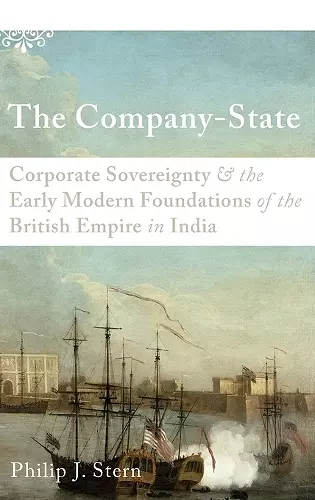The Company-State
Corporate Sovereignty and the Early Modern Foundations of the British Empire in India
Format:Hardback
Publisher:Oxford University Press Inc
Published:26th May '11
Currently unavailable, and unfortunately no date known when it will be back
This hardback is available in another edition too:
- Paperback£40.99(9780199930364)

The Company-State rethinks the nature of the early English East India Company as a form of polity and corporate sovereign well before its supposed transformation into a state and empire in the mid-eighteenth century. Taking seriously the politics and political thought of the early Company on their own terms, it explores the Company's political and legal constitution as an overseas corporation and the political institutions and behaviors that followed from it, from tax collection and public health to warmaking and colonial plantation. Tracing the ideological foundations of those institutions and behaviors, this book reveals how Company leadership wrestled not simply with the bottom line but with typically early modern problems of governance, such as: the mutual obligations of subjects and rulers; the relationship between law, economy, and sound civil and colonial society; and the nature of jurisdiction and sovereignty over people, commerce, religion, territory, and the sea. The Company-State thus reframes some of the most fundamental narratives in the history of the British Empire, questioning traditional distinctions between public and private bodies, "commercial" and "imperial" eras in British India, a colonial Atlantic and a "trading world" of Asia, European and Asian political cultures, and the English and their European rivals in the East Indies. At its core, The Company-State offers a view of early modern Europe and Asia, and especially the colonial world that connected them, as resting in composite, diffuse, hybrid, and overlapping notions of sovereignty that only later gave way to more modern singular, centralized, and territorially- and nationally-bounded definitions of political community. Given growing questions about the fate of the nation-state and of national borders in an age of "globalization," this study offers a perspective on the vitality of non-state and corporate political power perhaps as relevant today as it was in the seventeenth century.
With great skill, Stern has extracted from the archives a cogent and highly engaging narrative of events that even participants found highly tremendously confusing. He deftly conveys the world of the East India company, marshaling striking visual materials and wonderfully evocative quotations from a wide array of Company documents. * Radical History Review *
A thought-provoking reinterpretation that will compel us to reexamine assumptions about colonial companies in general. * H-Net *
In a work of deep erudition and striking originality Philip Stern deftly demolishes many of the categories by which we try to organize our work: are states and companies really different animals, were the early modern Atlantic and Indian Oceans distinct worlds, what, if anything, was new about the post-Plassey British Indian empire? We are politely but firmly directed back to the drawing board. * P. J. Marshall, King's College London *
In The Company-State, Philip Stern has made an important contribution not only to studies of empire, but to early modern history in general. This is an important and innovative reconsideration of the East India Company as a political actor in the first phase of its career. This incisively crafted book will be widely read, cited, and debated. * Sanjay Subrahmanyam, University of California, Los Angeles *
A bracing re-thinking of the early modern East India Company and its role in shaping English practices of empire, governance, 'trade,' and polity, Philip Stern's book will replace all previous studies on the topic. * Kathleen Wilson, Stony Brook University *
- Winner of Winner of the Morris D. Forkosch Prize of the American Historical Association 2011 Honorable mention, Ralph Gomory Prize of the Business History Conference.
ISBN: 9780195393736
Dimensions: 168mm x 236mm x 31mm
Weight: 590g
320 pages